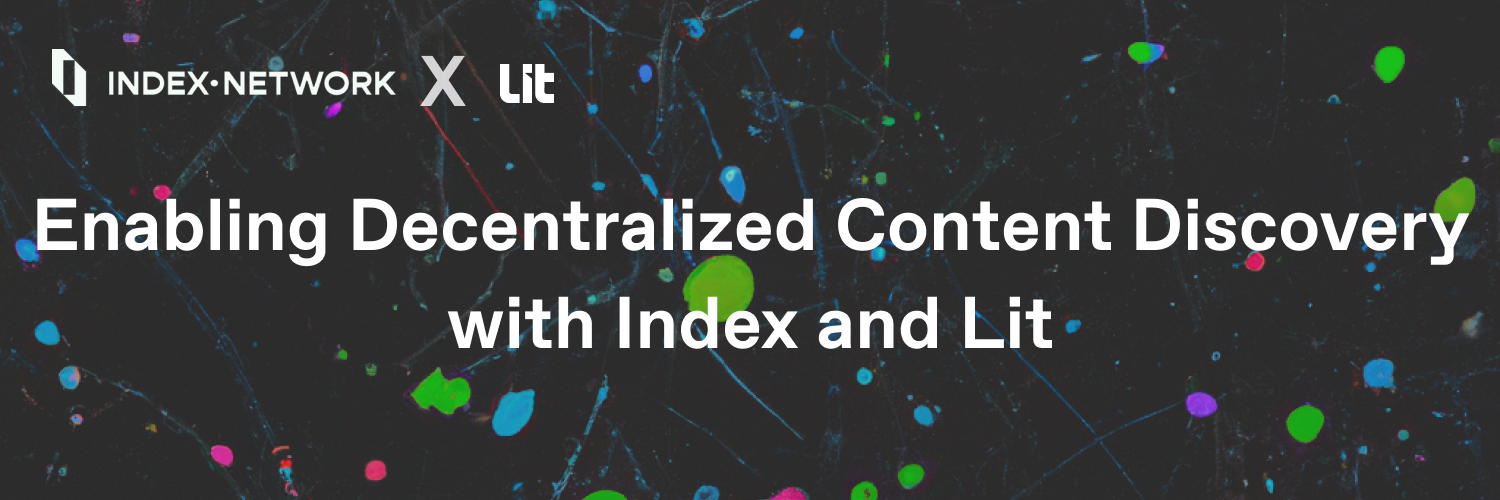Enabling Decentralized Discovery with Index Network and Lit

Index Network is a creator tool to make composable discovery engines. Our partnership with Lit Protocol enables zero-knowledge creator roles for indexes, and brings new creator groups into the discovery ecosystem.
Summary
Discovery is a critical component of decentralization, but it lacks an open and interoperable standard. To reflect all perspectives and tastes in the information ecosystem, discovery should be an open and interoperable network by principle. Recognizing this, Index Network ultimately serves as the facilitator of contextual discovery in web3 by enabling a network of discovery engines.
Index Network allows creators to make contextual discovery engines by indexing their own information (such as articles, products, and documents) to ComposeDB. On top of that, it supports composable queries across these discovery engines evolving new pathways and crafting a discovery experience that genuinely mirrors the richness, diversity, and depth of human society.
Lit Protocol serves as a fundamental component of Index Network, facilitating trustless collaboration through the ownership of NFTs. Lit Protocol allows creators to specify on-chain criteria such as "user must hold an NFT" and the network provides signatures to those that meet those criteria. This brings composability to collaboration and enables a diverse range of new user groups —including companies, communities, and DAOs— to actively participate in the decentralized discovery ecosystem.
Our use of Lit Protocol
Index Network allows users to set creator roles over indexes using NFT ownership. This provides granular management of who has permission to index new documents:
Composable Collaboration
To achieve this functionality, Index Network uses two interrelated services of Lit Protocol: Programmable Key Pairs and Lit Actions. PKPs are public/private key pairs generated by the Lit network through a process known as Distributed Key Generation (DKG). In this method, each node holds only a portion of the underlying private key, referred to as a key-share, ensuring the complete private key never exists in its entirety. Lit Actions are the immutable 'rules' (JavaScript functions stored on IPFS) that get assigned to a PKP and specify its signing logic. To achieve collaboration in a decentralized way, we ensure each index is controlled by a user-owned PKP and associated with a unique Lit Action.
Lit Protocol allows users to establish specific on-chain criteria that must be met for signing (AKA a 'conditional signature'). These criteria can include things like membership in a DAO, holding a particular NFT in a collection, possessing a certain amount of a token, or the outcome of any smart contract function call.
By composing conditions like these, creators can customize signing rules in a flexible manner, granting specific rights to different users as needed. Collaboration on this scale opens up a lot of possibilities for organizing information in a new and powerful way.
Using Lit Actions to generate DID Sessions
Index Network allows users to manage multiple documents simultaneously, star an index, and perform various other activities. Given the range of actions possible, it would be impractical to require users to sign each action with a blockchain wallet. To address this, we initiate the following steps:
Within the Lit Action, we verify that the user has the necessary permissions for the index then sign a SIWE (Sign in with Ethereum) message on behalf of PKP, which confirms the user's identity and grants time-bound write permissions for that specific index document on ComposeDB. Within the user client, we transform the signed SIWE message into a Chain Agnostic Capability Object (CACAO) and initiate a DID Session with the capability object to activate the granted permissions for the index.
This is a critical UX improvement that simplifies user interactions by reducing manual approvals and is achieved while maintaining security.
Roadmap: Automated Indexing with the Lit Event Listener
Lit Actions can be triggered by specific events, such as on-chain activities, webhooks, or smart contract calls. At Index Network, we are going to use this capability to make automated indexing possible for different data types, including on-chain media and DAO proposals.
Conclusion
At Index Network, our mission is to enable greater participation in discovery, ensuring that trusted opinions, unique tastes, and diverse perspectives are visible on the open web. Our integration with Lit Protocol introduces new groups to the discovery ecosystem, which aligns closely with our primary mission. We are thrilled to continue our collaboration with Lit Protocol, exploring various use-cases, including enabling access control for indexes and facilitating automated indexing.
Index Network is an open-source project and live on testnet! Dive in and experience it at index.network. We're moving at full speed and are eager to hear about your feedback!
Contribute to Index Network on GitHub.
Connect with Index Network on Twitter or Discord.
Lit Protocol Resources
💻 Developer Documentation: https://developer.litprotocol.com/
👾 Discord: https://litgateway.com/discord
🧑💻 GitHub: https://github.com/LIT-Protocol
🕊 Twitter: https://twitter.com/LitProtocol
🖥 Website: https://litprotocol.com/

